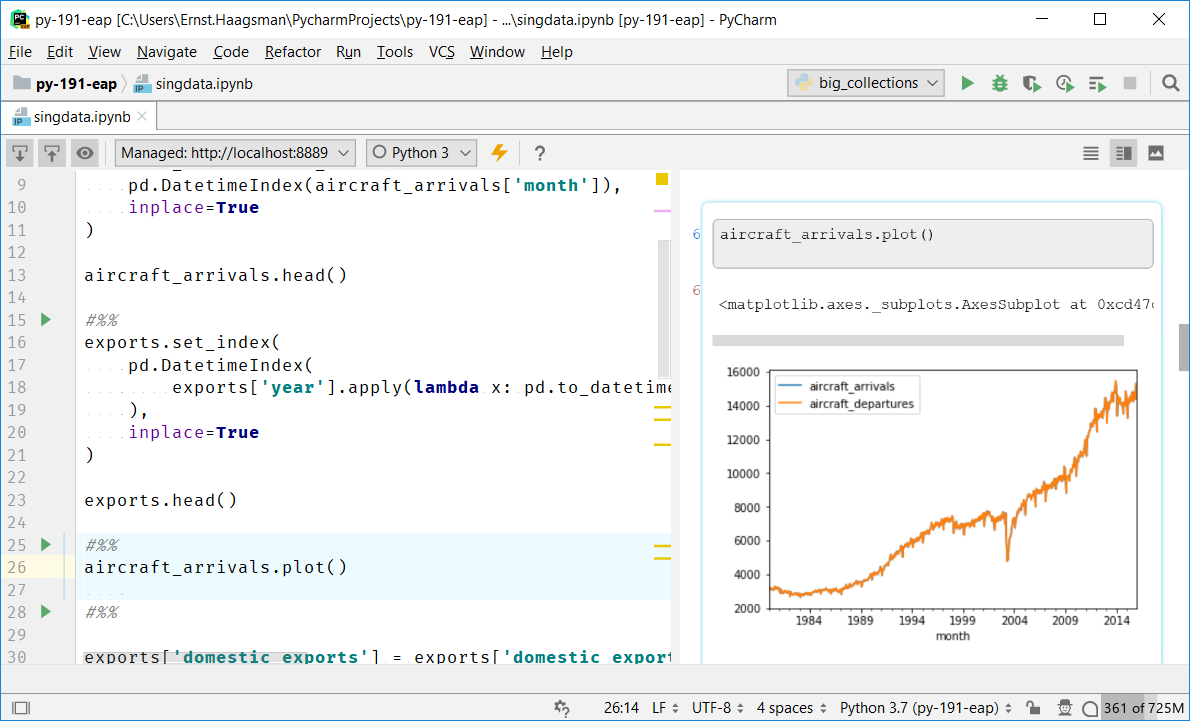

- Jupyter notebook vs rstudio software#
- Jupyter notebook vs rstudio code#
- Jupyter notebook vs rstudio professional#
Among many other features, RStudio includes a file manager, a function help, a variable explorer, and a project manager all of which make analysis much easier and faster as opposed to the browser-only Jupyter.
Jupyter notebook vs rstudio software#
R Notebooks can only be created and edited in RStudio, but this is a case where tight vertical integration of open-source software is a good thing.
Jupyter notebook vs rstudio code#
Each cell also has a green indicator bar which shows which code is running and which code is queued, line-by-line.įor Notebook files, a HTML webpage is automatically generated whenever the file is saved, which can immediately be viewed in any browser (the generated webpage stores the cell output and any necessary dependencies). The cells are indicated by three backticks and a gray background in RStudio, which makes it easy to enter a code block, easy to identify code blocks at a glance, and easy to execute a notebook block-by-block. Instead of having separate cells for code and text, a R Markdown file is all plain text. ( RPubs has many examples of R Notebooks, although I recommend using GitHub Pages to host notebooks publicly). nb.html file, which can be viewed as a webpage on any system. The default output of an R Notebook file is a. Rmd format, useful for rendering analyses into HTML/PDFs, or other cool formats like Tufte handouts or even books. More specifically, R Notebooks are an extension of the earlier R Markdown. R Notebooks are a format maintained by RStudio, which develops and maintains a large number of open source R packages and tools, most notably the free-for-consumer RStudio R IDE. However, today we’ll look at the relatively new R Notebooks, and how they help improve the workflows of common data analysis in ways Jupyter Notebooks can’t without third-party extensions. Over the years, there have a been a few new competitors in the reproducible data analysis field, such as Beaker Notebook and, for heavy-duty business problems, Apache Zeppelin. Although Jupyter is a Python application, it can run kernels of non-Python languages, such as R. The final Notebook can be exported as a HTML file displayable in a browser, or the raw Notebook file can be shared and rendered on sites like GitHub. In addition to code blocks, Jupyter Notebooks support Markdown cells, allowing for more detailed write-ups with easy formatting. In Jupyter Notebooks, each block of Python input code executes in its own cell, and the output of the block appears inline this allows the user to iterate on the results, both to make the data transformations explicit and to and make sure the results are as expected. The Notebook format allows statistical code and its output to be viewed on any computer in a logical and reproducible manner, avoiding both the confusion caused by unclear code and the inevitable “it only works on my system” curse. Here's a link to Jupyter's open source repository on GitHub.Īccording to the StackShare community, Jupyter has a broader approval, being mentioned in 76 company stacks & 40 developers stacks compared to RStudio, which is listed in 5 company stacks and 5 developer stacks.Jupyter Notebooks, formerly known as IPython Notebooks, are ubiquitous in modern data analysis. Jupyter is an open source tool with 5.99K GitHub stars and 2.54K GitHub forks. Jupyter can be classified as a tool in the "Data Science Notebooks" category, while RStudio is grouped under "Integrated Development Environment". You can expand the types of analyses you do by adding packages. One button deployment of Shiny applications, R Markdown reports, Jupyter Notebooks, and more.Ĭollections of R functions, data, and compiled code in a well-defined format. Publish and distribute data products across your organization. An integrated development environment for R, with a console, syntax-highlighting editor that supports direct code execution
Jupyter notebook vs rstudio professional#
The notebook combines live code, equations, narrative text, visualizations, interactive dashboards and other media RStudio: Open source and enterprise-ready professional software for the R community. The Jupyter Notebook is a web-based interactive computing platform. Jupyter: Multi-language interactive computing environments. Jupyter vs RStudio: What are the differences?


 0 kommentar(er)
0 kommentar(er)
